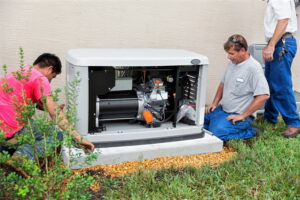A home generator is one of those investments you hope you’ll rarely need—but when you do, it needs to work flawlessly. Whether it’s a blizzard knocking out the grid or a summer storm taking down power lines, your generator is the lifeline that keeps your home running smoothly. But like any complex machine, generators require regular care—and sometimes, expert repairs.
But even the most reliable systems can wear down over time. Regular upkeep is essential, and knowing when to involve a professional can make the difference between a quick fix and a major outage.
1. Your Generator Won’t Start—or Won’t Stay Running
This is the most obvious sign something’s wrong. If your generator refuses to start—or starts and then shuts down—you’re likely dealing with a deeper mechanical or electrical issue. It could be a clogged fuel line, a battery issue, or a failing alternator. Whatever the cause, it’s best not to guess. Professional technicians can diagnose and fix the issue before it gets worse.
2. You Notice Strange Noises or Vibrations
Generators typically hum or rumble at a consistent volume when operating normally. Don’t ignore if yours starts making grinding, knocking, or high-pitched squealing noises. Unusual sounds often indicate internal damage or worn-out parts that could lead to more extensive (and expensive) repairs if left unchecked.
3. There’s a Noticeable Fuel or Oil Leak
A leaking generator isn’t just messy—it’s a fire hazard. Fuel or oil leaks can also cause permanent damage to the engine and surrounding parts. If you spot a puddle or notice a strong fuel smell, shut down your unit immediately and call in a professional. Attempting DIY repairs without proper knowledge can increase the risk of injury or further damage.
4. It’s Been More Than a Year Since the Last Inspection
Even if your generator seems to be working fine, regular maintenance is essential. Most manufacturers recommend at least one professional inspection per year. If it’s been longer than that, or if you’ve noticed your generator running less efficiently, it’s time to schedule a visit. Preventive care is always more cost-effective than emergency repairs.
5. The Power Output Is Inconsistent
Fluctuating voltage or frequent overload shutdowns are clear signs that something isn’t right. These problems can damage sensitive electronics in your home and may point to issues with the generator’s voltage regulator, wiring, or internal components. A certified technician can quickly test and adjust these systems to ensure reliable performance.
6. You’re Not Sure What’s Wrong
Sometimes, the symptoms aren’t clear, or you’re not sure how serious the issue is. If you’re second-guessing your diagnosis or searching endlessly online for answers, it’s time to bring in an expert. Electrical systems are too important to leave to chance.
If you want to extend the lifespan of your unit, improve reliability, and avoid costly breakdowns, consider scheduling routine home generator maintenance in Amherst, NY, with trusted professionals who know the local weather and power conditions.






